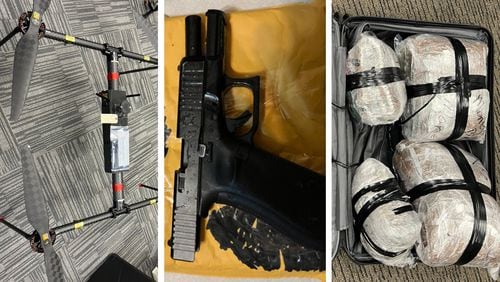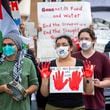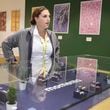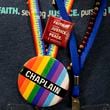Braves first-year general manager Alex Anthopoulos is a native Canadian who worked for the Blue Jays from 2003 through 2015, serving as general manager for the final six seasons of that period, including the 2015 season when Toronto won the American League East and ended a 22-year postseason drought.
After turning down a lucrative five-year extension offer from the Blue Jays and going to the Dodgers as a vice president for two seasons, he was hired as Braves GM in November, following the forced resignation of former Braves general manager John Coppolella.
After three consecutive seasons with at least 90 losses during their rebuilding project, the Braves are a surprising first-place team with the National League’s best record (42-29) before Tuesday.
Anthopoulos spoke with reporters from Canada and Atlanta in the visitor’s dugout at Rogers Centre before Tuesday night’s game between the Braves and Blue Jays, the opener of a two-game series in Toronto. Here are excerpts from that interview.
How does it feel to be back here in Toronto?
“The first time I came back was five months after I left, it was in a different role with the Dodgers. New to the organization, I did not want to be a distraction. Obviously because it was so fresh since I left I got a lot of requests from media. So I didn’t want to do something out here, we just did something in the media room. To be honest with you I didn’t even want to come to the park (with the Dodgers in that first series back), not because I don’t love this place, I was just very apprehensive about being a distraction with a new club and the role I was in. I just didn’t think it was appropriate. Obviously time’s passed, and I think it’s a little more appropriate; obviously I do media anyway (as Braves GM). It’s great to be back. I still come back to the city quite a bit. My kids go up north during the summer, so they’re all here and they spend the summer here and I still commute back and forth. But last time I was here (at the ballpark) was with L.A. in 2016.”
Are you surprised the Braves are this good this soon?
“You know what, we didn’t know what to expect. We knew there was a lot of talent here. I’ve said this many times, all the (Braves) GMs before me – John Schuerholz, Frank Wren, John Hart – these guys did an amazing job, and the scouting department. There’s a ton of talent here, so those guys deserve all the credit. They all should be really proud of what’s going on here. We knew there was a lot of talent and the plan was just to sit back and let these guys plan, maybe add some things, bring some information. We had a game plan in the offseason of what we could be doing from a development standpoint and how could we potentially make guys better with information we were going to provide them and the staff and try to get the most out of their abilities. Whether that was five percent of 10 percent, we don’t know. But they’re all talented. So if they have good seasons we wouldn’t have been surprised and if they were competitive we wouldn’t have been surprised, but you just don’t know with a young team when guys are going to emerge.”
Has your philosophy changed as far as promoting young players? (re: Mike Soroka, who’s 20 and making his fifth start Tuesday, and Ronald Acuna, also promoted at 20)
“I think things have changed a little bit. You learn from everything; I look back all the time, not only at successes but mistakes made. Soroka, he’s 20 years old. People talk about age and things like that. We needed a starter against the Mets. They were in first place at the time, it was on the road, he didn’t have that much time at that (Triple-A) level. He looked good in spring training. We didn’t care about his age, we didn’t care about the number of starts, he was clearly our best chance to win the game. We don’t worry about the service time or Super Two (arbitration) or free agency or any of those type of things.
“We were a competitive team, a good team, and I think you have to weigh the short time and the long term. He had a chance to help us. Could he have been well served to have another 10 starts down there? Sure. But we didn’t think he was going to be (overwhelmed) being up here. ... I don’t think you can just have a set age or set number of innings, I just don’t think it works that way. It’s totally different for different players. You have to weigh the needs of the team and long-term goals as well. ...
“(In the case of Acuna’s promotion in late April) guys we had playing left field weren’t playing as well (as they had at the start of the season), so the timing made sense. We lost two to the Reds, he had been hot the last four or five (games at Triple-A). Guys in left field weren’t really hitting, we felt like that was the right time to bring him up and a good time to get him to feel good about himself.”
On being OK making potential deals with the current Blue Jays front office:
“Those guys are great. We had trade discussions this offseason. Obviously we couldn’t come to a deal, but ... I dealt with them in L.A. The way we had it set up in L.A. (in Dodgers front office), there were three of us in the office – myself, Andrew Friedman and Farhan Zaidi -- and we basically had it set up where we almost split the job in three so we all had an account, 29 teams, 10, 10 and nine (split), Toronto was mine. So when we had discussions, I had relationships, I had knowledge and intel, and I dealt with Toronto. It’s not new to me. As much as I was out of the formal (GM) role for two years, I did a lot of the same things and I still kind of stayed in the mix.”
On Braves selecting Soroka with the 28th pick of the 2015 draft, when Toronto had the 29th pick that year in Anthopoulous’ final season as Toronto GM:
“From talking to people in Atlanta, they were concerned about the Jays selecting him. I can’t tell you who would’ve been the (Blue Jays) pick, but I can tell you they were concerned about the Jays selecting him because we were right behind, and the Canadian component there. So, I mean, the amateur (scouting) department in Atlanta obviously did a great job with him. The good news is, when you’re here (with the Blue Jays), he goes ahead of you (in the draft) so you don’t feel as bad. But I know, I looked at all the scouting reports and things like that, the Braves did an outstanding job. The people that needed to get him right on evaluations did. They put in good reports on him, they had a lot of data on him as well.
“Their amateur scouting department here (Braves), they’re very thorough, in terms of makeup and work ethic. Soroka, being around him – I asked him the other day, we were in the lounge in the Atlanta clubhouse; he’s only 20, so I asked, ‘Hey, you get to come back (to Canada to start against the Blue Jays), is this a big deal for you, is it cool?’ He’s like, ‘It’s going to be fun. It’s going to mean something to me, it’s pretty important, I have a lot of friends and family that are going to come out.’ I know for his first start he was very aware of the Canadian Baseball Hall of Fame and getting him some stuff. I don’t know how much he’ll express that (excitement) in media interviews, but I know that, being Canadian, being here is really important to him.”
Are you a better GM now than when you were with the Blue Jays?
“I think going to L.A. helped me a lot. Not to say that I had all the answers at any time. I thought I got better at the end in Toronto; I think I said it at the time, I think I learned a lot being here and making some mistakes here. I felt really good at the end of 2014 making some changes, I felt really good at the end of the year (2015) before I left. And I think going to L.A., it was deciding between the Astros and L.A. and it worked out. I didn’t get the ring, but both places I was going to achieve what I wanted to achieve, going to a place where I could get exposed to some new things and grown and get better. So I think a lot of things I learned here I tried to bring a little bit to Atlanta, and things I learned in L.A. I tried to bring a little bit. Take a lot of good that Atlanta had and keep it going.”
What have you thought of Freddie Freeman being around him and seeing him every day?
“He’s amazing to see. When I got here (to the Braves) we basically did an analysis of every player, just our own internal – we call it a ‘deep dive,’ where we really take a look under the hood at how good these guys are. And it was just like, wow. There are some things that he does. We do our meeting in spring training with all the players and basically told him, you’re going to have to change your hat size when we get done with you, because his head was going to get huge, because he’s just. ... The bat speed, in-zone swings, defensively, the makeup and how tough he is – a lot of those guys, that’s a credit to the people before me that brought them in.
“You look at games played, which is a quality that I learned to value towards the end of my time here (in Toronto). But Nick Markakis (playing virtually every day) in his career, Freddie Freeman the same way – that rubs off on other players. Those guys are tough and set an expectation for all the other players. It’s hard to quantify, but it’s real. And then with the great ability, (Freeman) loves being a Brave. He’s gone through some rough years. The other thing too, we added some things in terms of data and information, he could have easily balked; he’s a guy that’s a Gold Glove-caliber defender and so on. We’d bring guys out early in spring training for (defensive) positioning; he could have easily been hard on us. But instead he was a big help, a big proponent, he really supported the things we were trying to implement.”
Are you surprised at how much fan support the Braves have shown, both in attendance and in having so many guys atop the All-Star voting at their positions?
“One of the questions I asked when I sat down with them (for job interview) was I asked about the fan base, I asked about the ownership. Especially seeing what happened here (in the fall), the impact, it makes this job great to see a fan base connect. You walk the kids to school, they’re wearing the (Braves) hats. ... And they told me about the South and how big a fan base the Braves have. Now I’m starting to see. Over 120 radio stations carry our games, traveling places for the draft, well outside of Georgia, well outside of Atlanta, fans are all over the place. I find there are a lot of similarities to the Blue Jays fans in Canada -- Braves fans are everywhere. And I’m not surprised now seeing it and being around it, but I would not have even dreamed this was the reality when I took this job.”





